The TSU is the DPP's traditional ally, and the two worked fairly closely together in 2012 to coordinate nominations: the TSU avoided running candidates against DPP nominees in the districts, and the DPP encouraged deep green voters to consider casting a party list vote for the TSU. That strategy paid off for the pan-green camp when the TSU won 8.96% of the party list vote, which returned it to the LY after a four-year absence. And in the districts, the DPP candidates won all but four constituencies that Tsai Ing-wen carried (and six that she didn't.)
Unfortunately for the TSU, it isn't looking so hot in the polls right now and probably won't win the five percent of the party list vote it needs to retain seats in the legislature. It's likely to be replaced by the NPP, which was founded only about a year ago and is running several high-profile candidates in district races. This could have been a major problem for the DPP: a new pan-green party with a strong pro-independence slant and brash leadership, targeting the same youth vote that the DPP is counting on to help it win a majority in the LY, and without a past history of coordination in elections.
Instead, the DPP leadership recognized this threat early on and worked out a cooperation agreement: the party would yield several districts to the NPP (only three, as it turned out), and the NPP would only campaign in those districts to avoid splitting the pan-green vote elsewhere. The arrangement has worked well enough that Tsai Ing-wen is even showing up to appear with some of the NPP candidates.
The DPP has pursued a similar approach to cooperation with candidates from other groupings, yielding several other seats to small parties. Via Solidarity.tw, here's the list of small-party candidates the DPP has endorsed:
- Taipei 3: Billy Pan (潘建志), Independent
- Taipei 4: Huang Shan-shan (黃珊珊), People First Party
- Taipei 5: Freddy Lim (林昶佐), New Power Party
- Taipei 6: Fan Yun (范雲), SDP-Green alliance
- Taipei 7: Yang Shih-chiu (楊實秋), Independent
- Taipei 8: Lee Ching-yuan (李慶元), Independent
- New Taipei 9: Lee Hsing-chang (李幸長), Independent
- New Taipei 12: Huang Kuo-chang (黃國昌), New Power Party
- Taoyuan 6: Chao Cheng-yu (趙正宇), Independent
- Taichung 3: Hung Tzu-yung (洪慈庸), New Power Party
- Taichung 5: Liu Kuo-lung (劉國隆), TSU
I noted this in a previous post, but it's worth reiterating here: this is smart politics by the DPP. They're ceding races that are not very competitive to third parties and independents in exchange for non-compete agreements in the critical races in the 25-45 range. (In fact, this ranking probably understates just how difficult some of these seats are: Taipei is more reliably blue than the rest of the island, so the swing toward Tsai there is likely to be lower than elsewhere.)
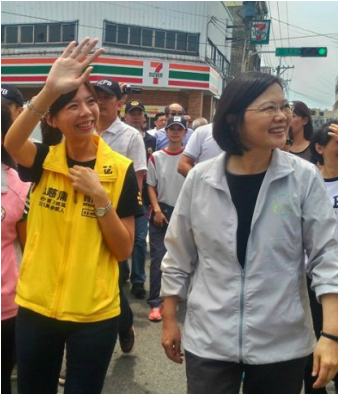 Tsai Ing-wen campaigns with Hung Tzu-yung in Taichung, November 2015. (Image credit: Storm Media)
Tsai Ing-wen campaigns with Hung Tzu-yung in Taichung, November 2015. (Image credit: Storm Media) One "yellow" district is high up the list, though, and it's a very interesting one: Taichung 3 is ranked #30. What's going on there? The NPP has nominated Hung Tzu-yung, and the DPP is not running a candidate. Like the NPP candidates elsewhere, Hung is already a well-known figure in Taiwan: she is the sister of Hung Chung-chiu (洪仲丘), a military conscript who died in July 2013 as the result of harsh punishment by his superiors. (The incident triggered large protests, the resignation of the Minister of National Defense, and the rapid passage of a far-reaching reform of the military justice system.)
By generic partisan lean, Taichung 3 is by far the most competitive district of any the DPP has yielded; a swing of just 2.33% toward Tsai would turn it green. If Hung can run anywhere close to Tsai's 2016 total in this district, she should win it easily. So, of the NPP candidates running for district seats, it's Hung, not Huang Kuo-chang (in New Taipei 12) or Freddy Lim (in Taipei 5), who is best positioned to win in 2016.
It's likely that the threat of NPP candidacies in critical races elsewhere gave them the bargaining power to get the DPP to yield Taichung 3, and as a result they're well-positioned to win at least one district seat, in addition to whatever they get from the party list. From the DPP's perspective, this is a good trade as well: they cede one competitive district for a full non-compete agreement everywhere else. And with one prominent exception, the deal has held.
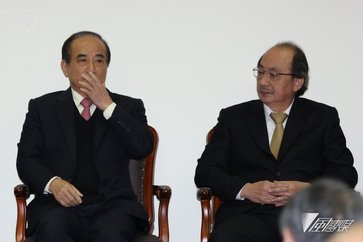 LY Speaker Wang Jin-pyng and DPP party caucus leader Ker Chien-ming. (Credit: Storm Media)
LY Speaker Wang Jin-pyng and DPP party caucus leader Ker Chien-ming. (Credit: Storm Media) That exception is Hsinchu City, where the DPP Legislative Yuan party caucus leader Ker Chien-ming (柯建銘) is running against both the KMT nominee Cheng Cheng-chien (鄭正鈐), a city council member, and the NPP's Chiu Hsien-chih (邱顯智). Ker is widely disliked by the NPP's core supporters, and Chiu has refused to withdraw from the race, creating the possibility of a serious pan-green split in the vote. With a big enough swing (11-12%) toward Tsai, this seat could be competitive, but it's likely to be close even then, so Chiu's candidacy could well be fatal to Ker's chances.
What's especially intriguing about this race is the possibility of an ulterior motive for the NPP, and possibly some elements of the DPP, too. As party caucus leader, Ker is in line to be the next speaker of the LY if he wins re-election, and he's likely to try to block any meaningful reforms of the cross-party negotiation mechanism (政黨協商) that has given the current speaker, Wang Jin-pyng, tremendous influence over the legislative process. That in turn could prevent Tsai Ing-wen from getting much of her policy agenda through the LY. I have no idea if Chiu's campaign is a deliberate strategy to take out Ker, but from the NPP's point of view, preventing Ker from winning re-election might just be worth splitting the pan-green vote and throwing the seat to the KMT. Some of that animosity clearly comes from Ker's long history of deal-making in the LY and his role as the key DPP member in closed-door cross-party negotiations. For instance, it's easy to forget that he was actually at the center of the special influence case that caused the open rift between Wang Jin-pyng and Ma Ying-jeou--it was a case against Ker that Wang leaned on prosecutors not to appeal.
By the way, isn't it curious that Ker is fighting for re-election in such a tough place for the DPP? (Tsai lost here in 2012 by 21 points.) How did this happen to the party caucus chair?! Ker was previously a party-list legislator for two terms, so by DPP party rules he has to run in a district now. Unlike the KMT, which flagrantly violated its own rules to allow Wang Jin-pyng to run for a third time as a list legislator, the DPP didn't yield on this point. But why Hsinchu? Well, that's where Ker is originally from; he won several consecutive races there under the old SNTV system. Now that the electoral system has changed to single-member plurality, though, he's got a much tougher challenge.
I'm a bit surprised that Ker didn't manage to parachute into an easier district somewhere else. The fact that he's not only running in Hsinchu but also facing a challenge from the NPP suggests some significant opposition to him from elsewhere within his own party. But if he overcomes the odds and wins his race, he is going to owe Tsai Ing-wen very little, and he may have a political axe to grind with her or some other elements of the DPP for putting him in such a tough position. If he ends up as LY speaker, he could quite plausibly be a DPP version of Wang Jin-pyng during the Ma era: a powerful and independent-minded leader whose first priority is protecting his own interests, not those of the president or his party. Given how badly that turned out for Ma Ying-jeou and the KMT, this race could have an outsized impact on relations between Tsai and the DPP caucus in the LY after the election. It's worth watching closely.
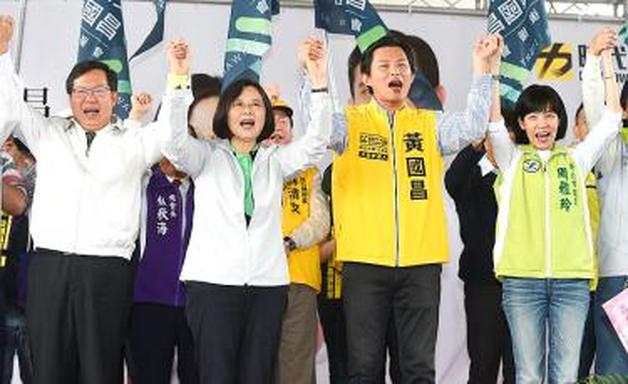
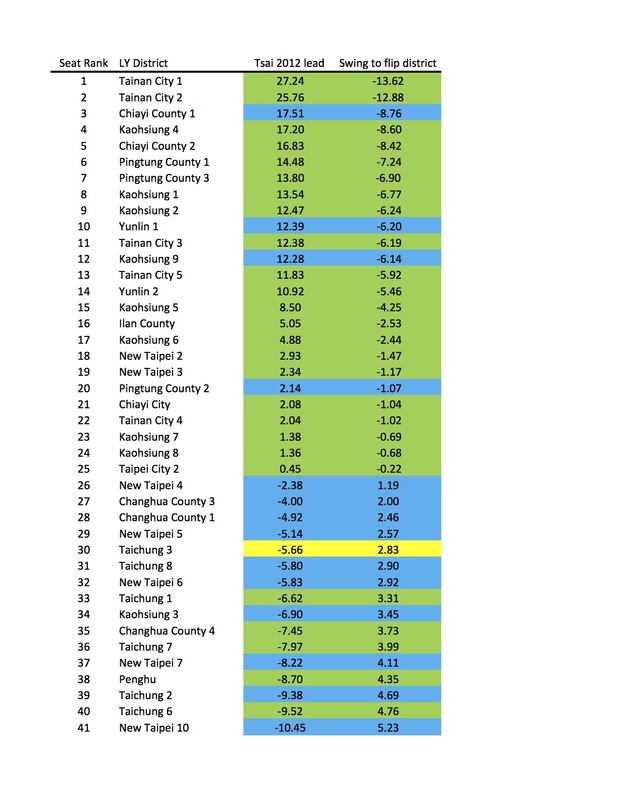
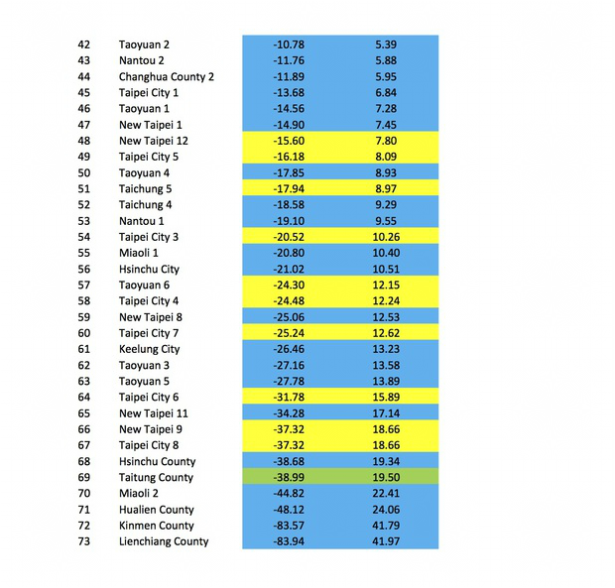
 RSS Feed
RSS Feed
